
|
Question #1:
Statistics show that pseudosciences grow stronger every day. For example, creationism is penetrating into the educational system, not only in the USA, but in countries like Croatia, too. Is this dangerous or not? That is, do we need to worry about it?
|

|
( MP3-AUDIO version - 702Kb) MP3-AUDIO version - 702Kb)
I think that pseudoscience can be dangerous. If it gets into a curriculum, we would like to try as scientists to do our best to keep things that are not science separate from science. I think that the biggest danger that we have in it is that science is a way of thinking and it is a process of going through and figuring out things for yourself. That, I think, is important to all types of thinking. Your experience in Croatia, with the war in just the last few years, has been where some people coming to power and believe that they can tell everyone else what to do. And, I think scientific thinking, where you are always looking to understand something for yourself and believe that you are capable of understanding something that can help prevent that type of thing from occurring again as it has so many times in the past.
And, the United States, I am not sure that is really growing worse as a problem. There is certainly always been efforts in this country going back for decades to try to put creationism into the curriculum. But, by in large, those have been far off and I think it is probably less common in a curriculum now than it used to be. I also know, most people who believe in pseudo-sciences or creationism or astrology or anything like that, often times they do not really believe it in a hard core way. They just have not thought it through that much. So, if we give them a chance to learn how science works, and let them discover for themselves the process of science, they will often see where the pseudoscience does not really make this much sense as it might seem to at first an than they can throw it off by themselves.
|

|
Question #2:
At the same time, statistics also show that more than one third of all high school seniors in the USA do not have even a basic competency in mathematics and about one quarter of them lack basic reading skills. These kids have very grim future in finding a decent job. This is a far more important problem for these kids than knowing the difference between science and pseudoscience. What does that mean for the USA as an economic, military, and scientific superpower?
|

|
( MP3-AUDIO version - 566Kb) MP3-AUDIO version - 566Kb)
I am not sure how much it means to the superpower status of the country, because of the 2/3 of the people are doing pretty well. We are going to have a lot of scientist and engineers and economically trained people. It is more of the personal tragedy, I think, for those people who are coming out without the skills to compete in the job force and get a good job. It means that they are not going to enjoy themselves in their jobs because they will have to take something that may not be what they really wanted to learn. So, I think, to me it is less about trying to remain a superpower than it is about trying to make sure that everyone gets a chance to have a decent education and to make something out of their lives that they will be proud of and pleased with.
Maybe this goes a little bit more to the general question of the US superpower status that I am somewhat an idealist. I like to think that, sure, the Unites States does not always wheeled its power in the best ways, but I like to think that our ideals are good, that what we are trying to do is to let everyone in the world to have a good chance to enjoy their lives and to be productive citizens. And, if we cannot even do that with our own citizens it is going to be hard for us to help the rest of the world to do that. So, I think we would like to make sure that we can give our citizens a good education and help other countries to give a good education to their citizens, also, so that everyone can get the most out of their lives.
|

|
Question #3:
What should be the role of scientists in public education? I often see scientists confused about the goal of their teaching. They are not trained as educators. In astronomy, for example: what level of knowledge should they expect from their students in the end?
|

|
( MP3-AUDIO version - 657Kb) MP3-AUDIO version - 657Kb)
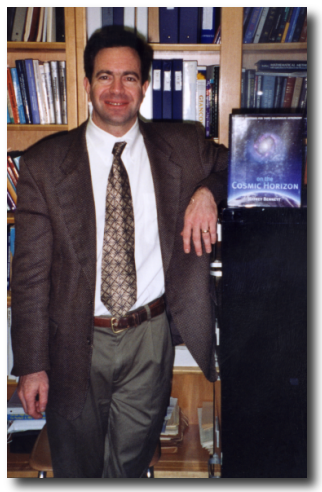 It depends on what we are talking about. If you are talking about students who want to be astronomers or physicists, they need a much different level of knowledge than just your students who are coming in for their general education. But over all, I see the roll of scientists and education as sort of a matter of giving back in the same way that we would expect people who have become very wealthy to give something back to their communities and not just be misers and keep all the money for themselves. We, scientists, are, in a sense, the richest people from the education system. We have gotten the benefit of having a great education and getting to explore the universe in a way that most people never get a chance to. We have gotten that chance because our societies have provided that opportunity to learn these things. It is therefore our obligation to turn around and try to give something back to our society.
It depends on what we are talking about. If you are talking about students who want to be astronomers or physicists, they need a much different level of knowledge than just your students who are coming in for their general education. But over all, I see the roll of scientists and education as sort of a matter of giving back in the same way that we would expect people who have become very wealthy to give something back to their communities and not just be misers and keep all the money for themselves. We, scientists, are, in a sense, the richest people from the education system. We have gotten the benefit of having a great education and getting to explore the universe in a way that most people never get a chance to. We have gotten that chance because our societies have provided that opportunity to learn these things. It is therefore our obligation to turn around and try to give something back to our society.
What we can best give back to our society is to help other people learn the same things that get us so excited about what we do. Astronomy, in fact, is a particular example because astronomical research is almost always funded by the government which means it is funded by the taxpayers. It is not fair if we ask people to pay for astronomical research and we do not tell them what we have discovered. We have to be able to present back to them; look at what you have been buying with your money and your effort, look at what you have been supporting, look how much it tells us about ourselves, about our species and our planet. So, I think it is our obligation to go back and to publicate education and share with the public what we are so excited about ourselves.
|

|
Question #4:
You believe that our civilization is at a critical juncture in history. What do you mean by that?
|

|
( MP3-AUDIO version - 1261Kb) MP3-AUDIO version - 1261Kb)
If you look at the history of human civilization, you see in some ways this incredible dichotomy between the parts that are great and the parts that are horrible. The parts that are horrible are destructive; where we go and kill and have wars and the parts that are great are our accomplishments, the building of great buildings, the creation of great music, the creation of science and discoveries about our place in the universe. We have always been doing both, we have always been creating and destroying, but there has been a big change in the last few decades in that the destruction that has been done, up until just a few decades ago, has always been limited in scope. We could do horrible things and horrible destruction but we could not ruin everything. We now have the capability to ruin everything, every since we had the atomic bomb. We have had the capability to destroy everything, utterly.
And, I would say that today the atomic bomb is still a huge threat, of course, but given that the cold war is ended and that the world seems to be working somewhat better together, I do not see that as the greatest threat. I see many other threats to our civilization and some that could be equally devastating if we do not deal with them. For example, we cannot let our population grow indefinitely. We would not physically fit on the planet, if we kept growing at the rate it is currently growing, in just a few centuries. We cannot let global warming destroy the planet, or the destruction of habitat in other species, because any of these things could bit us back in a way that could mean the end of our civilization.
So, we are at a critical juncture in history because, for the first time in the many thousands and millions of years of human history, we have the power to destroy everything in a relatively short period. On the other hand, if we do not destroy ourselves, within the next few centuries, we will achieve incredible things that might, for example, allow us to start building colonies on other planets, possibly even sending people to other star systems and starting to develop what you might called a galactic civilization in which we would begin to spread out. We would almost become extinction proof, because if we are spread out among many plants, a war in one place is not going to destroy every other place, and global warming in one place is not going to destroy every other place.
So, if we can come through this next century or a couple of centuries without ruining everything that we have built for so long, I think we will reach a point where we will not really have to worry about it. Particularly because we would be extinction proof, in the way I just said, but also because, in order to solve the problems we have today, we are going to have to develop social structures and educational structures and political structures that make war a thing of the past and that make hatred a thing of the past. So if we can get through this juncture in human history, I believe it will mean that we have solved most of our great problems.
|

|
Question #5:
The concept of "global education" is very noble concept, but, to be honest, it sounds like a utopia. Most of the human population has earthly problems to care about every day. Why would they look at broader concepts of humanity and technology and cosmos if they do not experience any of these?
|

|
( MP3-AUDIO version - 819Kb)
( MP3-AUDIO version - 819Kb)
( AVI-VIDEO version - 2.9Mb) AVI-VIDEO version - 2.9Mb)
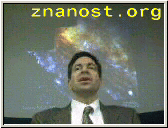 In some sense, it is a utopia, but I thing it is an achievable utopia. First of all, I agree with you that we have to deal with every day problems first. People will not care about these broader issues and learning our place in the universe if they have every day problems to deal with. But, I think that those problems can be solved. In many cases, they have been solved. For example, if you go back into the 1700's, Thomas Malthus and his famous essay predicted that, our growing population, we would be unable to feed within just a couple of years. Here we are a couple of hundred years later with the population over 6 billion people and we do have enough food for everyone right now, although some people are still starving because the food does not get distributed well due to political problems. But, we can in principle feed everyone in the world today, we can in principle provide health care to everyone in the world today.
In some sense, it is a utopia, but I thing it is an achievable utopia. First of all, I agree with you that we have to deal with every day problems first. People will not care about these broader issues and learning our place in the universe if they have every day problems to deal with. But, I think that those problems can be solved. In many cases, they have been solved. For example, if you go back into the 1700's, Thomas Malthus and his famous essay predicted that, our growing population, we would be unable to feed within just a couple of years. Here we are a couple of hundred years later with the population over 6 billion people and we do have enough food for everyone right now, although some people are still starving because the food does not get distributed well due to political problems. But, we can in principle feed everyone in the world today, we can in principle provide health care to everyone in the world today.
The utopia, if you think about it, you go back just a century and even in a rich country like the United States, you could not assume that your children would live to adulthood. I think something like half of all children died before reaching adulthood, and yet today, almost all children survive to be adults at least in the United States because we have modern health care and there is no reason why we cannot give that to everyone in the world. We have not yet, but the world is capable of doing that. And, if we can take care of these day to day problems, give people the basics of what they need to survive, the next step is to educate them. So, that they understand the world they live in, understand the science that has made it possible for them to have these things, the health care and food. That they understand why they should be inspired now by the discoveries we have made in astronomy to strive to go to the next step in their own lives and in the life of our civilization. So, I think both things are possible.
|

|
Question #6:
One of your thoughts about education sounds particularly interesting to me. You say that a stronger relationship between the public and private sectors is critical to the success of a global education effort. What do you mean by that? And, how to stimulate this process?
|

|
( MP3-AUDIO version - 1798Kb)
( MP3-AUDIO version - 1798Kb)
( AVI-VIDEO version - 6.3Mb) AVI-VIDEO version - 6.3Mb)
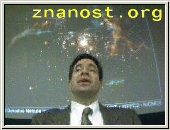 The simple fact is that most of the economy, at least in the United States and I think around most of the world, is driven by private sector. The government is some fraction of the total economy. In the United States, for example, about 20% of the gross national product goes into the government; the other 80% is all private enterprise. So, right off the bat the private sector dominates the economy over the government. Secondly, most of what the government does with its money is other government functions besides education. Education is only a small part of that total government spending. Other things are the military, supporting retirement, supporting health care and things like that.
The simple fact is that most of the economy, at least in the United States and I think around most of the world, is driven by private sector. The government is some fraction of the total economy. In the United States, for example, about 20% of the gross national product goes into the government; the other 80% is all private enterprise. So, right off the bat the private sector dominates the economy over the government. Secondly, most of what the government does with its money is other government functions besides education. Education is only a small part of that total government spending. Other things are the military, supporting retirement, supporting health care and things like that.
If you are trying to solve any kind of problem, you want to use the resources as efficiently as you can. And, the resources are always going to be more in the private sector than they are in government because the private sector is always bigger and generates a lot more money. Now, in terms of how you can get the private sector to pay attention to things like education is that you have to convince the private sector that it is in their business interests to do so. Often times that just happens naturally and often it requires some help from government or society structures to make that happen. It happens naturally sometimes because, for example in the United States, you mentioned the problem with having a lot of our graduates not really be competent in reading and mathematics. Well, that has led to a situation were there is a shortage of talented and educated employees for the private sector and in a lot of communities big companies have started contributing to education simply because they need those people to be educated so that they will be able to hire them and have them as talented employees.
So, sometimes the business precede its self-interest on its own in that way. In other cases you probable need some regulation. I will give you an example having to do with global warming. We know that global warming is a very serious problem for the world and if we do not stop it, it could turn into a catastrophe for our species. But, it is a catastrophe that is years or decades off and it is very difficult to get the private sector to believe that it is in their interest to do something about this problem right now. So, people try to come up with structures, emissions trading and so on, that makes it in the private sectors interest to reduce carbon dioxide emissions. Those kinds of things, I think, in principle can work because they are certainly into business' long-term interest. If we destroy our civilization, nobody is making anything. So, it is been all of our interest to find a way for us to get through this critical juncture that we talked about before and allow our civilization to survive.
This means we have to solve problems like global warming. It means we have to solve the political problems that could lead to nuclar war, and it means we have to solve the educational problems that leave people not caring. People have to care. So, it is in the private sectors' long-term interest to support education. What we need to do is find ways of making sure it is also in their short term interest by having rewards, maybe tax breaks, maybe other things that make it viable for the private sector to contribute. I will give you a couple more examples of what you can do. Sometimes, this is just done by companies, sometimes it is done because they have got some influence from a local government.
My wife works for a large company and her company recently started a policy of having every employee, including the chief executive, spend some time each month, once a month, to go to a local school to work with some of the students and talk to them about business and about what can be done if you get a good education. They help to motivate the students, they also spend part of that day just working in the classroom. For example, my wife is a Corporate Vice President, but once a month she is in a 3rd grade classroom, teaching people how to read. That helps her understand the challenge of education, it gives the teacher some support on that the day that she is there, and it teaches the Corporate Executives about what teachers have to go through and how we can better help teachers do their jobs.
|

|
Question #7:
What is the role of mass media in education? Or, maybe a better question is: what should their role be?
|

|
( MP3-AUDIO version - 1088Kb)
( MP3-AUDIO version - 1088Kb)
( AVI-VIDEO version) AVI-VIDEO version)
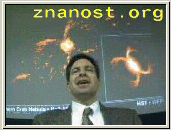 The role of mass media should be to help educate everyone around the world, because it is the easiest and most cost effective way to reach huge numbers of people. Now, of course, mass media has quite a mixed record in this. There are certainly some successes. I would argue, for example, that CNN has done a tremendous service to global education because you now can get news from all around the world, anywhere in the world. You get news not only about the politics but also about science and other things. I think that has done a great service in contributing to education all over the world.
The role of mass media should be to help educate everyone around the world, because it is the easiest and most cost effective way to reach huge numbers of people. Now, of course, mass media has quite a mixed record in this. There are certainly some successes. I would argue, for example, that CNN has done a tremendous service to global education because you now can get news from all around the world, anywhere in the world. You get news not only about the politics but also about science and other things. I think that has done a great service in contributing to education all over the world.
On the other hand, we all know that Hollywood puts out all kinds of garbage that is horrible. I think that maybe one of the differences that we see there is that CNN for the most part has done a good job of assuming that if they present news that people out there would be interested in it. When Ted Turner started CNN, everybody said he could not make a go of it because people did not care enough about the news, but it turns out that they do. I think that the biggest failing of mass media is that they tend to underestimate the intelligence of people around the world and therefore they send stuff out that is pretty awful. When they do on occasion put things out that are intelligent, they always seem shocked that they get a good response.
A couple of examples that I will give is Carl Sagan's series “Cosmos” which turned out to be the most viewed public television show in history. And yet, it is a very high level intellectual series about astronomy. It's popular! You would think that the mass media would learn from that. If they put good stuff out there, people will watch it and it will pay off for them. Another recent example is the movie “Lord of the Rings”, which I saw recently and very much enjoyed. That is much more quality literature and much more quality movie than most of what Hollywood puts out. And yet, it has been extremely popular. It got nominated for an academy award, as did another movie this year, called “A Beautiful Mind” which was about a noble prize winning mathematician. The noble prize was in economics, of course. It actually talks some about his ideas that lead to the noble prize, although it focuses biographically on his life. And, it has also been very popular.
I would hope that the mass media would start to learn that in putting out the usual dribble. If they put something real into it that can contribute to global education, that they will still make lots of money but they will be doing a services at the same time and maybe they will even earn more money because they will be more people who will be interested in it and care about it.
|

|
Question #8:
Finally, you have your list of Top 10 Mysteries of the Universe. What are they and what do we gain by solving them?
|

|
( MP3-AUDIO version - 3875Kb)
( MP3-AUDIO version - 3875Kb)
( AVI-VIDEO version - 13.1Mb) AVI-VIDEO version - 13.1Mb)
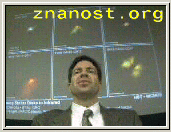 First, let me say it is my personal list of the top ten mysteries in the universe. That is not anybody has agreed upon list. It is just things that I particular find interesting. I will list them off briefly for you and tell you briefly why I thought they were interesting questions. I do a countdown. We have a show in the United States that is quite popular and it is called “The David Letterman Show” and he does top ten countdowns, and I got the idea from him to do this.
First, let me say it is my personal list of the top ten mysteries in the universe. That is not anybody has agreed upon list. It is just things that I particular find interesting. I will list them off briefly for you and tell you briefly why I thought they were interesting questions. I do a countdown. We have a show in the United States that is quite popular and it is called “The David Letterman Show” and he does top ten countdowns, and I got the idea from him to do this.
 My mystery number ten is:
My mystery number ten is:
10. Is There Life Elsewhere in our Solar System?
If we were find life anywhere else, it would tremendously revolutionize our understanding of biology in particularly because it is hard to know what biological possibilities are when everything that we study is all of one single type of biology, the biology life on earth. We can be pretty sure today that there is no civilization anywhere else in our solar system, but it could be that there is other places, such as Mars, or Jupiter's moon Europa where there might be microbes or possibly even some bigger organisms. Trying to find out if that is the case is on my list because if we discover life and if we start to learn about it, it will really helps us to understand biology better in general.
 My mystery number nine was something called the solar neutrino problem:
My mystery number nine was something called the solar neutrino problem:
9. where are all the Sun's neutrinos?
The theory has long predicted a certain number of neutrinos, these are tiny subatomic particles. A certain number of these should be coming from the Sun and the observations were finding a fewer than the theory predicted. And, the questions was: what is wrong? Very recently, I think this mystery may have been already solved because the new experiment has shown that the neutrinos are in fact there, but our previous experiments were not capable of detecting them. This gives us confidence that our understanding of stars is correct which is important to our general understanding of astronomy.
 Mystery number eight is:
Mystery number eight is:
8. what does the Universe look like?
Sometimes, people are surprised that we can not simply answer this. But, the Universe is very big place and to know what it looks like is hard because we are stuck in a small piece of it, on the Earth in our galaxy. We are trying to look at many other galaxies and figure out how they are arranged. That is not, in principle, that difficult, but requires a lot of observations, a lot of telescope time, and we are just beginning to get our first real answers to what the Universe looks like at the larger scales.
 Mystery number seven is:
Mystery number seven is:
7. how do galaxies evolve?
We live in a great galaxy containing a hundred billion or more stars. Our sun is just one of those stars and the Earth is one planet going around that star. We have a pretty good understanding today of how stars are born, live, and die, and how that relates to our own existence on earth. But, we have much less developed understanding of how galaxies proceed from birth to the current state. We are hoping to learn much more about that in the next few years.
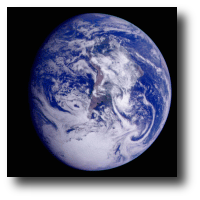 Mystery number six is:
Mystery number six is:
6. are earth-like planets common?
We have discovered, some of you may know, in the last few years many planets around other stars. But so far, all the planets that we have discovered are much larger than the Earth. They are Jupiter size or Saturn size. We do not yet know whether planets the size of earth, and therefore we assume planets that might be earth-like and perhaps have life, are common elsewhere in our galaxy or in the Universe. We are hoping that in the next couple of decades to begin to learn that and that, of course, we are plying to the question whether could be life around other stars.
 My mystery number five is the question, which will sound a little strange at first:
My mystery number five is the question, which will sound a little strange at first:
5. what are gamma ray bursts?
Astronomically speaking, this is something a lot of people probably have not heard about. There are the bursts of form of light called gamma rays. It is the highest energy form of light and contains even more energy than X-rays. There are these bursts of gamma rays that we have been detecting over the last decade or so, happening apparently somewhere in the Universe about once a day. We have now learned that they come from quite far away. Based on how bright they are in gamma rays and how far away they are, we now know that they are essentially the most powerful explosions that ever occur anywhere in the Universe at these days. For the most part, we do not really have a good idea what is causing them. That makes it a pretty big mystery. We are starting to get a hint that they may be coming from a special type of exploding star, but we would like to know for sure.
 My mystery number four might sound even more esoteric at first:
My mystery number four might sound even more esoteric at first:
4. did the Universe have a bout of inflation?
In turns out that in our modern idea of the Universe, where the Universe begun with the Big Bang and it has been expanding ever since, there is a few things that are very difficult to explain. But, we can explain them all if we assume that, very early in the history of the Universe, it had a short fraction of a second during which it underwent a usually rapid expansion, which we call inflation. It suddenly inflated like a balloon suddenly inflating. I will not go into any details about that other than to say it is a very, very good idea that explains a lot of things, but experimentally we do not yet have any solid evidence to tell us whether it is true. We would like to collect some evidence so that we will know whether this good idea is actually something that qualifies as a scientific theory, in which case we mean that it is supported by measurable experimental evidence.
 Mystery number three is:
Mystery number three is:
3. what is the fate of the Universe?
In some sense, since the Universe is expanding, the possible fates are either that it will continue to expand forever, or that the expansion will someday stop and the Universe collapse. But, in fact, we have recently, in just past five years, learned that there may be more to it than that. To astronomers great surprise, in the last five years, we have found that the expansion of the Universe rather than slowing down, as we would expect to be the case since gravity should be acting to slow the expansion, is instead actually speeding up. And so far, no one really has any good idea about what might be causing the acceleration of the Universe which means that the whole question about the fate of the Universe is also up in the air.
 My mystery number two is:
My mystery number two is:
2. what is the Universe made of?
It is another very surprising one to most people.
You would think we just look out there and can figure out what is made of. We figured out that the chemicals in the Universe are almost entirely hydrogen and helium, but we have also discovered in the last few years that that is only a small part of the whole story. In fact, the most of the Universe must be made of something else, which we know it is out there because we see its gravitational effects on stars and galaxies. But, we do not see the stuff itself. It is not emitting any light, so we call it dark matter. We do not know what it is. Hopefully, some day we will figure out that one, too.
 My mystery number one is:
My mystery number one is:
1. are we alone?
I mean, are there other civilizations out there asking questions just like we are, who we might potentially talk to, might potentially contact, might potentially join up with in the galactic civilization someday.
You also asked, what do we have to gain by solving questions like this? I think, in astronomy, what we always have to gain is learning something about ourselves. A couple of thousand years ago, it was generally thought that we are the center of the Universe. Now we know differently. I would claim that not everyone knows differently today. In fact, a lot of people probably have not heard that we are not the center of the Universe because our global education has not reached much of the world's population, yet. And, even those people who have heard it may not really understand what it means to not be the center of the Universe but to instead be on a tiny little planet orbiting a single star out of billions of stars in one galaxy out of billions of galaxies in the Universe. I would say that, in that respect, humanity is an incredible achievement because here, on our tiny little spot, in our little corner of the Universe, we figured it out that the rest of the Universe exists. We figured it out how, from the Big Bang ten or more billion years ago, we got to be here. And, that is an outstanding achievement. I think, if everyone on earth recognized the value of that achievement and recognized that if we keep fighting our wars and taking poor care of our planet, we will ruin that achievement. Maybe people would behave a little bit better, we would not have people trying to overtake other cultures, committing genocides, committing acts like September 11th, maybe everyone on the world would behave a little bit better.
|

|
Question #9:
Once, I was asked: "Why do you need to know if there is life in the Universe? So what if there is?" Really, what do we gain by knowing that?
|

|
( MP3-AUDIO version - 1129Kb)
( MP3-AUDIO version - 1129Kb)
( AVI-VIDEO version - 3.9Mb) AVI-VIDEO version - 3.9Mb)
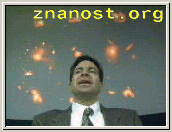 By learning about life in the Universe, we can gain a lot. It depends, first of all, on what type of life we are talking about. If we learn just about other microbes on other planets, as I talked about a little bit earlier, that in itself could revolutionize our understanding of biology and biochemistry in ways that could have enormous benefit for the human species and might revolutionize medicine and all kinds of other things.
By learning about life in the Universe, we can gain a lot. It depends, first of all, on what type of life we are talking about. If we learn just about other microbes on other planets, as I talked about a little bit earlier, that in itself could revolutionize our understanding of biology and biochemistry in ways that could have enormous benefit for the human species and might revolutionize medicine and all kinds of other things.
When we talk about life in the Universe, though, most people think more about civilizations and finding other civilizations. This questions is a very interesting question because there are some surprising aspects to it. One being that the Universe has being around for a very long time before our Solar System was even born. If civilizations are common you might expect that some of them should already have achieved the things we might hope to achieve in the future: interstellar travel, colonizing the galaxy, studying great things throughout the galaxy. And yet, we do not see any evidence that that is the case. So, if you think about the possibilities you find some incredible profound implications. It could be that there is already other civilizations that have done these great things. Some people other there may have seen the movie “Contact”, or better yet, read the novel by Carl Sagan. He talks about this possibility. If it is true we are on the verge of possibly joining up with a civilization that may predate us by millions or even billions of years. Imagine what we could learn from them.
We also, as I talked about a little while ago, know that we are at a critical juncture in history. We need to solve some very difficult problems if we are going to survive. If we make contact with another civilization, and if that civilization went through the same critical juncture and did survive, it could be very valuable for us to talk to them and find out how they did it, so that we could try to do some of the same thing.
If it turns our that there is no other life out there, that we are alone in the Universe, then it means that we are the only part of the Universe that has figured out that the rest of it is here. Which makes us even more special and unique than just the fact that we in a rare place in the Universe where the rest of the Universe knows if it exists. I think that this gives us even a greater obligation to take care of incredible achievements of our spices and make sure we do not destroy them and everything we have worked so hard to accomplish.
|
|



 IMPORTANT: If you experience a problem with playing the video files provided below then most probably you do not have DivX Codec installed on your computer. DivX is available at www.divx.com/divx and it is free and easy to install!
IMPORTANT: If you experience a problem with playing the video files provided below then most probably you do not have DivX Codec installed on your computer. DivX is available at www.divx.com/divx and it is free and easy to install!